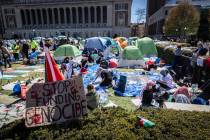Blame Utah?
The evidence of a liberal landslide in the Nov. 4 election is ample. The decisive victory of Democratic presidential candidate Barack Obama included the conversion of several red states to blue, including Nevada. The Democrats gained seats in the U.S. Senate and House. Michigan legalized medical marijuana. South Dakota and Colorado defeated anti-choice legislation.
But there was one stinging exception: Proposition 8.
The passage of Prop. 8 outlawed same-sex marriage in California and called into question the validity of 18,000 marriage licenses granted over the past six months.
The outcome shocked opponents, who figured Prop. 8 was doomed, a victim of Obama's coattails and the state's bent toward liberalism and tolerance.
What happened? Many analysts credit Mormons, who gave more than $15 million to promote Prop. 8 and volunteered for the campaign.
Now, gay rights activists are lashing out at Mormons, arguing that they cannot be allowed to walk away from this vote unscathed. Rallies have been held in front of Mormon temples and some have called for a boycott of Utah. The boycott has urged skiers to travel elsewhere to slip down the snowy slopes and Hollywood types to skip the Sundance Film Festival.
One high-profile advocate of a Utah boycott is Dan Savage, editor of The Stranger, an alternative weekly newspaper in Seattle and author of the syndicated sex advice column "Savage Love," published locally in Las Vegas CityLife.
"Since all Mormons-in-good-standing must tithe 10 percent of their earnings to their church, some part of any dollar you spent in a Mormon-owned business -- and they're almost all Mormon-owned businesses in Utah -- flows toward an anti-gay church that wages anti-gay political campaigns," Savage wrote. "Ski Colorado, Washington state and British Columbia. Don't ski Utah."
Naturally, Savage's call for a Utah boycott was not well-received in the Beehive State. Even Salt Lake City's liberal-minded alternative newsweekly bristled. John Saltas, founder and president of City Weekly, answered Savage:
"All Utahns aren't to blame, nor are all Mormons," Saltas wrote. "According to donor lists ... only 562 Utahns donated money in support of that ballot measure."
Saltas also ridiculed Savage's suggestion to ski in Colorado instead. "Uh, Danny boy -- ever heard of Jim Dobson and his Focus on the Family Forum? That Colorado Springs-based group generated over a quarter-million dollars to support Proposition 8, so enjoy the bad snow."
Further, Saltas wrote, "a Utah boycott hurts the very people Savage claims to speak for. A great deal of tourist dollars spent here go to the club, restaurant and entertainment industries, each of which provides ownership and gainful employment for a large number of gays and lesbians."
The Savage-Saltas imbroglio is a sideshow in the Prop. 8 aftermath, but it touches on the core issue for advocates of same-sex marriage: What now?
Boycotting Utah doesn't make a lot of sense. Most of Utah's Mormon population certainly doesn't care if gays and lesbians avoid the state, and as Saltas noted, a boycott hurts only the thousands of gays and lesbians living and working in Utah.
In addition, while the Mormon Church and its members played a big role in Prop. 8's passage, they were simply exercising their constitutional rights of free speech and political advocacy. What's more, the Mormons came late to a campaign that already was being waged by Catholics, evangelicals and other religious conservatives. Mormons represent a small percentage of the 6.43 million Californians who voted for the measure.
Religious conservatives won this one. They spent more and they were better organized. Sound familiar? That's how Obama won.
So what now? Attack on three fronts.
First, Prop. 8 will be argued in court. The California Supreme Court agreed this week to rule on its legality. Opponents sued on grounds that the measure is not an "amendment" to the state constitution but a "revision" of the constitution's equal protection clause. If the court deems it a revision, that means a majority vote on a ballot measure is not a legal method for approval. A revision requires a two-thirds vote of the Legislature or a state constitutional convention.
Second, Prop. 8 opponents will try to place a new question on California's 2010 ballot. And they are likely to be better organized and better funded the next time. Perhaps they'll hire a few of Obama's campaign gurus to help them out.
Third, voter education remains paramount. For example, analysts note that majorities of African-Americans and Hispanics voted for Prop. 8 at the same time that they voted for Obama. These would seem to be prime constituencies to support same-sex marriage if they can be persuaded that it's a civil rights issue, not a moral issue.
Gary Peck, Nevada director of the American Civil Liberties Union, is optimistic that it's only a matter of time before marriage equality is the predominant law across the land. "I'm confident that we are on the right side of history," he said.
Geoff Schumacher (gschumacher@ reviewjournal.com) is publisher of Las Vegas CityLife, owned by the same company as the Review-Journal. His column appears Friday.




















